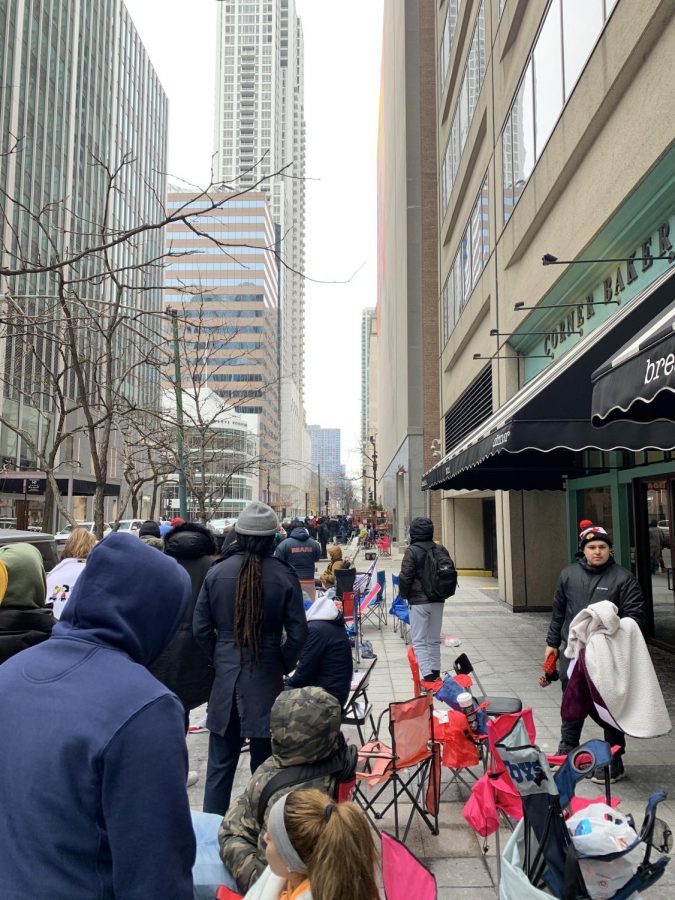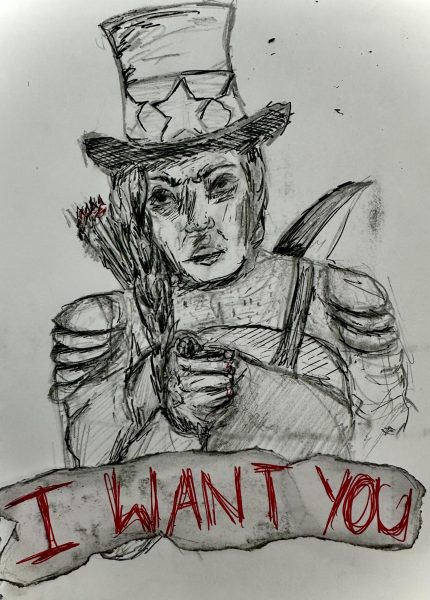Sneaker culture is officially dead
A first come first serve release at the Nike Chicago store on Feb. 9. The line started on the corner of Michigan and Erie and continued around the corner of the next block.
Scrolling through Facebook groups like “SNEAKERS ONLY CHICAGO” and “Kream Chicago,” a sense of nostalgia sweeps over me. These groups once facilitated network building of sneaker heads across the Chicagoland area. These were the places to find the shoe you wanted in a fair, organic, authentic and personal manner.
Now, plagued by hypebeasts looking for a quick profit, members of the Facebook groups spend their time swiping past the endless lists of shoes like Off-White Dunks, indistinguishable iterations of the Adidas Yeezy 350 v2 and whichever Travis Scott release resellers are asking outrageous prices for.
It seems like nowadays it is just one limited release after the other with the entire stock ending up right in the hands of greedy resellers that have a multitude of bots.
Essentially, a bot is a computer program that, among other things, adds items to carts and enters credit card information automatically and thus faster than a human customer.
This technology, designed specifically for purchasing shoes within milliseconds of them releasing, leaves customers purchasing the shoes manually with almost no chance of success.
Someone interested in the pair itself, not just the resale value it holds, does not stand a chance against Joe Shmoe sitting at home with his 10 bots.
After millions of people across the world were still processing and mourning the death of Kobe Bryant on Jan. 26, resellers wasted no time in buying Kobe related products, predicting that their value would skyrocket following his tragic passing.
According to an ESPN article, Nike removed all of their Kobe related products to prevent people from profiting off his death. However, it was too late as the article noted that not only had a majority of Kobe merchandise had sold out, but the sneakers and memorabilia prices had jumped 200-300% on secondary markets within 24 hours of Bryant’s passing.
It is clear that there are too many people buying shoes because of the hype behind them, not because they take an interest in the look, quality or any other sentimental attribute of the sneaker.
Even worse, people take their new pair of shoes and throw on whatever sweatpants and neutral color hoodie is clean, a total disrespect to not only the shoes but the culture as well.
By pairing the valuable shoes with whatever combination of shirt and pants you grab first, with no foresight, you reduce the worth of shoes to any other Nike runner or Adidas shell toe. That is not what they deserve.
I’m not saying that these people don’t deserve the shoes. They purchased them with their own money in an authentic manner and can do whatever they choose with their own property, but by doing so, they squash the sanctity of caring enough about the shoes to make them actually look presentable.
The sneakerhead to sneakerhead transactions that used to dominate this secondary market is another piece of the culture that is rapidly fading. After people purchased the valuable shoes for retail either by camping out or lucking out in a raffle, they sold them to local buyers, strengthening relationships, the community and the culture.
Today, many of these sales have been replaced by online vendors. Platforms like Grailed, StockX or GOAT facilitate the transactions of sneakers and clothing between users across the world. These apps provide people with quick and easy ways to move their product.
But they have to make money too. You can expect these apps to take out 9-11% as well as an additional fee from PayPal, a banking system required to have installed when selling through the previously mentioned apps.
The side effect is that people have no connection to where this shoe is going, no face-to-face contact between the seller and buyer. This development is hard to see because of how integral meeting the person you are buying/selling is in building the community. These apps have wiped out the formation of huge sneakerhead networks.
People trading shoes, camping out together, trying to outdo each other with the outfits they could assemble and ultimately building relationships was what it used to really be about. Now, unfortunately, when there is money to be made, American capitalism permits people to abuse the system as much as financially possible, sucking the culture out of once vibrant communities.
Your donations directly fund the Lane Tech student journalism program—covering essential costs like website hosting and technology not supported by our school or district. Your generosity empowers our student reporters to investigate, write, and publish impactful stories that matter to our school community.
This website is more than a publishing platform—it's an archive, a research tool, and a source of truth. Every dollar helps us preserve and grow this resource so future students can learn from and build on the work being done today.
Thank you for supporting the next generation of journalists at Lane Tech College Prep!

Eitan Silver is a Senior here at Lane Tech. A member of the Omega concentration, he is very much interested in the history and English classes. He is also...





